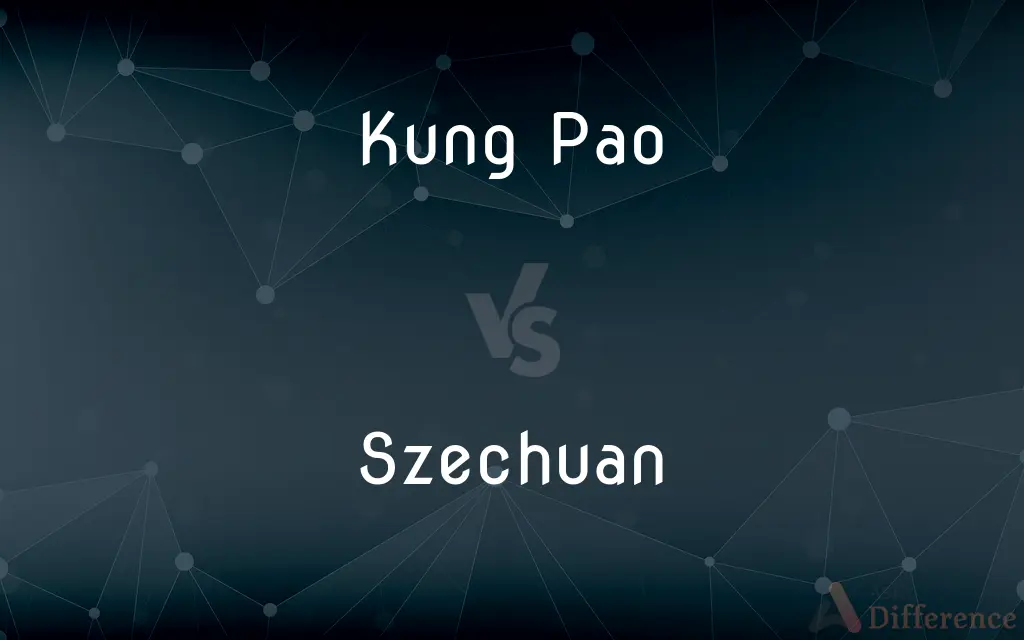Kung Pao vs. Szechuan — What's the Difference?
Edited by Tayyaba Rehman — By Fiza Rafique — Published on November 12, 2023
Kung Pao is a spicy, stir-fried Chinese dish made with chicken, peanuts, and vegetables. Szechuan cuisine is known for bold flavors, particularly the pungency and spiciness resulting from liberal use of garlic and chili peppers.

Difference Between Kung Pao and Szechuan
Table of Contents
ADVERTISEMENT
Key Differences
Kung Pao, originating from the Sichuan province of China, is widely recognized for its spicy and savory flavors. Szechuan cuisine, on the other hand, encompasses a variety of dishes from the Sichuan region, characterized by bold and pungent flavors, with an extensive use of garlic, chili peppers, and the unique Sichuan peppercorn.
Kung Pao is not only a dish but also a cooking style, often involving stir-frying as the primary method of cooking. Szechuan cuisine employs a diverse range of cooking methods, such as frying, stir-frying, steaming, braising, and more, providing a wide array of options for culinary exploration and enjoyment.
Kung Pao is globally recognized for its distinctive combination of chicken, peanuts, and chili peppers, harmoniously blended with a savory and slightly sweet sauce. Szechuan cuisine brings forward a plethora of dishes, each with its own unique blend of flavors and ingredients, often tilted towards a spicy and pungent profile owing to the liberal use of various seasonings and spices.
Kung Pao often uses a specific assembly of ingredients to create a signature flavor profile and textural experience. Szechuan cuisine, with its rich and diverse offering, spans beyond a single dish, enveloping a vast realm of flavors, ingredients, and cooking techniques under its spicy umbrella.
Comparison Chart
Type
A specific dish
A cuisine style
ADVERTISEMENT
Spiciness
Moderately spicy
Typically very spicy
Ingredients
Chicken, peanuts, chili peppers
Varied, utilizes a wide array
Flavor Profile
Spicy, savory, slightly sweet
Bold, pungent, often extremely spicy
Region of Origin
Sichuan province of China
Sichuan region of China
Compare with Definitions
Kung Pao
A dish that often involves stir-frying as its primary cooking method.
Kung Pao tofu is a fantastic option for a vegetarian stir-fry.
Szechuan
A style of Chinese cuisine originating from Sichuan province.
Szechuan dishes are known for their bold and spicy flavors.
Kung Pao
A dish known for its flavorful sauce, often with soy sauce, hoisin sauce, and chili peppers.
The Kung Pao sauce complemented the stir-fried vegetables perfectly.
Szechuan
Known for utilizing Sichuan peppercorns providing a unique “numbing” spice.
Szechuan chicken often makes use of the numbing effect of the peppercorns.
Kung Pao
An internationally popular Chinese dish often adapted to local tastes.
The American version of Kung Pao tends to be less spicy than its Chinese counterpart.
Szechuan
A cuisine using a wide array of ingredients and cooking methods.
Szechuan cuisine offers diverse options from stir-fries to braised dishes.
Kung Pao
A Chinese stir-fry dish with chicken, peanuts, and vegetables.
I ordered Kung Pao chicken for dinner because I was craving something spicy.
Szechuan
A culinary tradition that often includes pungent and spicy flavors.
Szechuan beef is tantalizing with its robust and peppery flavor profile.
Kung Pao
A cooking style from Sichuan cuisine characterized by spiciness.
The Kung Pao shrimp combines heat from the peppers and sweetness from the sauce harmoniously.
Szechuan
A cuisine that often features bold use of garlic and chili peppers.
Szechuan eggplant skillfully blends the spiciness of chilies and aromatic garlic.
Szechuan
A populous province of south central China
Common Curiosities
Can Kung Pao be made without peanuts?
Yes, though traditional Kung Pao has peanuts, they can be omitted for allergies.
What is a notable feature of Szechuan cuisine?
Its bold, pungent, and often very spicy flavors are notable.
What kind of meat is commonly used in Kung Pao?
Chicken is most commonly used in Kung Pao.
Are there vegetarian dishes in Szechuan cuisine?
Yes, Szechuan cuisine offers a variety of vegetarian dishes.
Can Kung Pao be made with other proteins besides chicken?
Yes, Kung Pao can be adapted using shrimp, beef, or tofu.
Is Kung Pao considered a part of Szechuan cuisine?
Yes, Kung Pao originated from the Sichuan province and is part of Szechuan cuisine.
Is Szechuan a type of dish or a cuisine?
Szechuan refers to a style of Chinese cuisine, not a specific dish.
How is Kung Pao typically cooked?
Kung Pao is typically stir-fried.
What vegetables are used in Kung Pao?
Bell peppers and onions are commonly used in Kung Pao.
Is Kung Pao always spicy?
Typically yes, Kung Pao is known for its spicy flavor.
Is Szechuan cuisine suitable for those who avoid spicy food?
Generally, Szechuan cuisine is quite spicy, but some dishes may be milder.
What makes Szechuan cuisine spicy?
The liberal use of chili peppers and Sichuan peppercorns make it spicy.
How do chefs achieve the unique flavors in Szechuan dishes?
Through the adept use of a variety of spices and flavorings, including garlic and Sichuan peppercorns.
Share Your Discovery

Previous Comparison
Voicemail vs. Voice Mail
Next Comparison
Pawn vs. PuppetAuthor Spotlight
Written by
Fiza RafiqueFiza Rafique is a skilled content writer at AskDifference.com, where she meticulously refines and enhances written pieces. Drawing from her vast editorial expertise, Fiza ensures clarity, accuracy, and precision in every article. Passionate about language, she continually seeks to elevate the quality of content for readers worldwide.
Edited by
Tayyaba RehmanTayyaba Rehman is a distinguished writer, currently serving as a primary contributor to askdifference.com. As a researcher in semantics and etymology, Tayyaba's passion for the complexity of languages and their distinctions has found a perfect home on the platform. Tayyaba delves into the intricacies of language, distinguishing between commonly confused words and phrases, thereby providing clarity for readers worldwide.












































